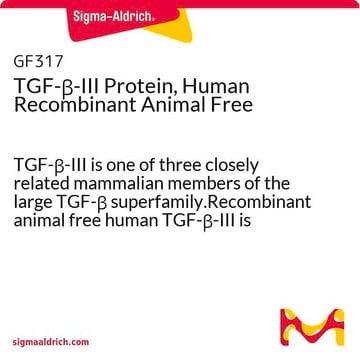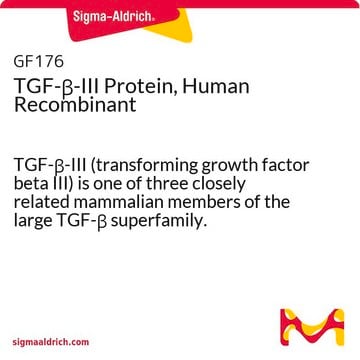H8791
Transforming Growth Factor-β3 human
HumanKine®, 95% (SDS-PAGE), recombinant, expressed in HEK 293 cells, lyophilized powder, suitable for cell culture
Sinónimos:
TGF-β3
About This Item
Productos recomendados
product name
Transforming Growth Factor-β3 human, TGF-β3, recombinant, expressed in HEK 293 cells, HumanKine®, suitable for cell culture
biological source
human
Quality Level
recombinant
expressed in HEK 293 cells
assay
≥95% (SDS-PAGE)
form
lyophilized powder
potency
≤1.0 ng/mL EC50
quality
endotoxin tested
mol wt
dimer 25 kDa (non-glycosylated)
packaging
pkg of 5 μg
manufacturer/tradename
HumanZyme
storage condition
avoid repeated freeze/thaw cycles
technique(s)
cell culture | mammalian: suitable
impurities
≤1 EU/μg
UniProt accession no.
storage temp.
−20°C
Gene Information
human ... TGFB3(7043)
¿Está buscando productos similares? Visita Guía de comparación de productos
General description
Biochem/physiol Actions
Physical form
Preparation Note
This product is lyophilized from a solution of 50mM NaOAc, pH 3.7.
Analysis Note
Legal Information
related product
Storage Class
11 - Combustible Solids
wgk_germany
WGK 3
flash_point_f
Not applicable
flash_point_c
Not applicable
Certificados de análisis (COA)
Busque Certificados de análisis (COA) introduciendo el número de lote del producto. Los números de lote se encuentran en la etiqueta del producto después de las palabras «Lot» o «Batch»
¿Ya tiene este producto?
Encuentre la documentación para los productos que ha comprado recientemente en la Biblioteca de documentos.
Los clientes también vieron
Nuestro equipo de científicos tiene experiencia en todas las áreas de investigación: Ciencias de la vida, Ciencia de los materiales, Síntesis química, Cromatografía, Analítica y muchas otras.
Póngase en contacto con el Servicio técnico









